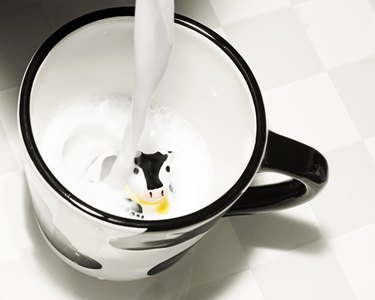
If you're lactose intolerant, it's understandable that you would want to find ways to include milk in your diet while minimizing your risk of uncomfortable digestive side effects that accompany dairy consumption. Although a cup of warm cocoa can look very tempting, you probably resist the urge to indulge for fear of getting too much lactose. Actually, heating milk breaks down some of the lactose -- unfortunately not enough to lessen your gastric symptoms.
Lactose
Video of the Day
Lactose is the sugar in milk and other dairy products. It's a carbohydrate, putting it in the same nutrient category as table sugar, fruit sugar and starch. You can use it to provide energy, just as you can use other carbohydrates for this purpose. Further, you can store its components in the form of the carbohydrate glycogen for later energy use, and if you consume too much, you can convert its components into fat, Dr. Lauralee Sherwood explains in her book "Human Physiology."
Video of the Day
Lactose Intolerance
Although most people don't need to pay attention to the lactose in food, many are concerned about it because they can't digest it. For those who are lactose intolerant, consuming dairy products causes uncomfortable digestive symptoms, including bloating and diarrhea. If you're lactose intolerant, you don't produce enough of the lactase enzyme, which breaks down milk sugar in your diet.
Hot Milk
Heating milk can actually break down some of the lactose to its component sugars, glucose and galactose, Drs. Reginald Garrett and Charles Grisham explain in their book "Biochemistry." This is especially true if you heat the milk for a long time. Unfortuately, the breakdown isn't enough to prevent symptoms.
Options
If you're looking to limit the amount of lactose in your diet, it's better to rely on proven alternatives to regular dairy consumption instead of trying to change the lactose in your milk by changing the temperature. You can use a lactose-free milk, or you can take lactase supplements, which will provide you with a temporary supply of the lactase enzyme, though they won't permanently affect your intolerance.